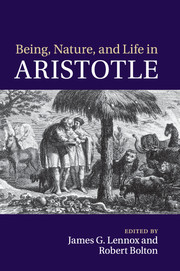Book contents
- Frontmatter
- Contents
- Preface
- Notes on contributors
- Acknowledgments
- Allan Gotthelf: a biographical sketch
- Note on abbreviations
- Introduction
- 1 Teleology, Aristotelian and Platonic
- 2 Biology and metaphysics in Aristotle
- 3 The unity and purpose of On the Parts of Animals 1
- 4 An Aristotelian puzzle about definition: Metaphysics Ζ.12
- 5 Unity of definition in Metaphysics Η.6 and Ζ.12
- 6 Definition in Aristotle's Posterior Analytics
- 7 Male and female in Aristotle's Generation of Animals
- 8 Metaphysics Θ.7 and 8: Some issues concerning actuality and potentiality
- 9 Where is the activity?
- 10 Political community and the highest good
- Allan Gotthelf's contributions to classical philosophy
- References
- Index locorum
- General index
10 - Political community and the highest good
Published online by Cambridge University Press: 06 December 2010
- Frontmatter
- Contents
- Preface
- Notes on contributors
- Acknowledgments
- Allan Gotthelf: a biographical sketch
- Note on abbreviations
- Introduction
- 1 Teleology, Aristotelian and Platonic
- 2 Biology and metaphysics in Aristotle
- 3 The unity and purpose of On the Parts of Animals 1
- 4 An Aristotelian puzzle about definition: Metaphysics Ζ.12
- 5 Unity of definition in Metaphysics Η.6 and Ζ.12
- 6 Definition in Aristotle's Posterior Analytics
- 7 Male and female in Aristotle's Generation of Animals
- 8 Metaphysics Θ.7 and 8: Some issues concerning actuality and potentiality
- 9 Where is the activity?
- 10 Political community and the highest good
- Allan Gotthelf's contributions to classical philosophy
- References
- Index locorum
- General index
Summary
INTRODUCTION
The Nicomachean Ethics announces itself as a treatise on the highest human good, the “end” (telos) of human life – namely, eudaimonia or happiness. In the last chapter of the work (10.9) Aristotle makes it clear that the studies that he has by then carried out in investigating the human good leave his objectives in the treatise not yet completely achieved. The leading themes so far, he says in the opening lines of this chapter, have been the happy lives of philosophical contemplation and political leadership, the virtues (of character and thought), friendship, and pleasure. But in fact, he began the work by saying (1.1–2) that the study it contains is intended as a contribution to “political knowledge” (politikē epistēmē) or the political capacity or power (dunamis). Its work will not be complete, he now says, in book 10, until a successful reader (or hearer) has been brought actually to possess that knowledge or power – political knowledge. By that he means the fully accomplished capacity for expert political engagement in affairs of state. Before the aim announced at the beginning of the Ethics can be achieved, then – that is, before we can fully define and explain in the right sort of way the highest human good, or eudaimonia (I shall say more in just a moment about what this right sort of way is) – we need, as he puts it in EN 10.9 (1180a32ff.
- Type
- Chapter
- Information
- Being, Nature, and Life in AristotleEssays in Honor of Allan Gotthelf, pp. 212 - 264Publisher: Cambridge University PressPrint publication year: 2010
- 10
- Cited by



